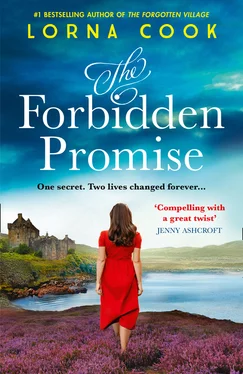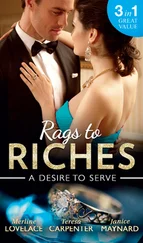Kate remembered the portraits on the stairs, the young man in RAF uniform, the girl in the silver-grey dress. She wondered if they were who James meant.
‘They should have inherited, one or the other of them, according to Mum,’ James continued. ‘But for one reason or another they’d lost touch with their parents, or maybe died. I’m not sure. There was a family rumour they had been disinherited years and years earlier but Dad and his parents didn’t take it seriously. So it was a complete shock when the line of inheritance missed out the McLays’ direct descendants for whatever reason, skipped sideways and landed on us Langleys.’
Kate hadn’t been paying too much attention to her surroundings. Instead she’d been entranced by James’s strange tale. It was with some surprise that she found they had reached the cottage. James had been right. From the direction of the loch, the hedges had tangled into thicket and had built up to a high level, camouflaging it from view. It was unlikely she would have seen it had she been alone. Instead they had doubled round and approached the cottage from the direction of the road that ran to the front of the estate. James’s battered Land Rover was parked some distance away on the track. It was a marvel he’d managed to locate her really.
‘Thank you,’ Kate said.
He frowned. ‘What for?’
‘Making the effort to find me, out there.’ She gestured to what she had now decided was The Wilderness.
He shrugged. ‘Don’t worry about it. You might have found it eventually.’ He raised his eyebrows theatrically. ‘Then again … you might not.’
She couldn’t help but laugh.
James bent down and pulled the brass key out from underneath the mat.
‘That’s a really brave place to keep it,’ Kate said. ‘Anyone could find it.’
‘Out here?’ He rolled his eyes as he unlocked the thick wooden door. ‘ You couldn’t.’ He looked pleased with his own joke. ‘Besides, it’s not here permanently. I left it there so the roofer could finish and pick up his tools. At least it’s watertight now. As I said—’ he indicated the cottage ‘—it’s not much.’ James turned the handle and Whisky beat his tail as he caught up with them, impatient to be let inside. ‘In fact some of the ghillie’s stuff from before the war is still here. Dusty. Moth-eaten. The McLays couldn’t be bothered to chuck it all out it seems, and neither could my dad. I did have half a mind that I could tosh the furniture up a bit instead of buying new. Holidaymakers love that reclaimed look, apparently. So don’t be surprised if you think it looks like a museum. Because it does.’
He opened the door, pushed it open and they stepped inside.
CHAPTER 9 Chapter 9 Chapter 10 Chapter 11 Chapter 12 Chapter 13 Chapter 14 Chapter 15 Chapter 16 Chapter 17 Chapter 18 Chapter 19 Chapter 20 Chapter 21 Chapter 22 Chapter 23 Chapter 24 Chapter 25 Chapter 26 Chapter 27 Chapter 28 Chapter 29 Chapter 30 Chapter 31 Chapter 32 Chapter 33 Chapter 34 Chapter 35 Chapter 36 Chapter 37 Chapter 38 Chapter 39 Chapter 40 Chapter 41 Chapter 42 Chapter 43 Chapter 44 Chapter 45 Chapter 46 Epilogue Acknowledgements Keep Reading … About the Author Also by Lorna Cook About the Publisher
August 1940 Chapter 9 Chapter 10 Chapter 11 Chapter 12 Chapter 13 Chapter 14 Chapter 15 Chapter 16 Chapter 17 Chapter 18 Chapter 19 Chapter 20 Chapter 21 Chapter 22 Chapter 23 Chapter 24 Chapter 25 Chapter 26 Chapter 27 Chapter 28 Chapter 29 Chapter 30 Chapter 31 Chapter 32 Chapter 33 Chapter 34 Chapter 35 Chapter 36 Chapter 37 Chapter 38 Chapter 39 Chapter 40 Chapter 41 Chapter 42 Chapter 43 Chapter 44 Chapter 45 Chapter 46 Epilogue Acknowledgements Keep Reading … About the Author Also by Lorna Cook About the Publisher
The cottage door slammed open, the metal catch clanging as it crashed against the stone wall inside. Constance was breathless; she’d been running so hard. In the woods she’d realised with every pounding step that, with a combination of duty and a longing to help him, she was desperate to see the pilot before he left as he’d sworn he would.
‘ You’ll never have to see me again ,’ he had said. And for one awful moment as Constance stood at the threshold and looked in, she believed it was true. As she’d left the cottage last night he had been drifting to sleep by the armchair. But the space he’d inhabited was now empty. During the night he must have thrown a few more logs on the fire, their charred, smoking remains reduced to dim embers in the grate.
She ran upstairs to see if he had chosen to sleep in the bed, but the bedclothes remained unruffled and the scent of settled dust lingered in the room. With her heart full of disappointment, Constance descended the staircase.
He had gone.
The pilot, Matthew, had moved one of the spindle-backed dining chairs from its position by the kitchen table and over to the fireside. Over the back he had draped her dress. She imagined him picking it up from the floor after she had left, touching it, taking the effort to look around the room, to find something appropriate from which to hang it; putting it a suitable distance from the fire so it would dry easily but not shrink from the proximity to the heat. She touched the dress with her fingertips, wondering at the effort he had made for her; such a small act but it held meaning that Constance couldn’t understand. He hadn’t just left it crumpled on the floor as others might have done. She stood, not quite knowing what she should do next. Somehow, going back to the house, back to her daily life, didn’t feel right. It was almost as if the events of last night, the aircraft disappearing into the water, swimming out to find the pilot, relief at finding him alive, sitting with him in this very room, held meaning, held an opportunity for … something? Not excitement. No. There had been plenty enough of that last night, heart pounding, frightening excitement. But something else nonetheless. The opportunity to be useful, to break free of the confines of the house and to embrace the war effort, even if it was only starting with keeping a stricken pilot safe while he recovered and came to his senses. It was a start. She looked around. All trace of him had gone.
It wasn’t really for Constance to worry about, but she was worried for him. She couldn’t help it. And now she would return home and see Henry, who had stayed the night, and her family at the breakfast table, other than Mother, who always took a tray in her room. Douglas would be talking non-stop about flying, about the ‘Hun’, about training or some such other nonsense. Henry, oh she didn’t know what to do about him, but in all likelihood he would be shooting daggers at her for spurning his advances last night. Or would he remain as confident as ever, as if nothing had happened at all? The boys were due to return back to their base at Kinloss today. Henry had seemed pleased that he’d been posted there, but Douglas was livid. He wanted to be down in the south of England, down in what he called ‘the real thick of it.’ He was desperate for his squadron to be posted almost anywhere other than on his own doorstep.
Constance thought him rather lucky. He wasn’t exactly out of harm’s way up here what with all the docks and Royal Navy Fleets to protect. But he didn’t seem to relish being a defender of his own patch of Scottish sky. She would have given anything to do something for the war. But until it became obligatory for women to join, if it ever became obligatory, Father had forbidden her. ‘Work isn’t for women like you,’ he had said. But Constance was twenty-one now. Didn’t that count for something? Was there really nothing she could do that would take her away from the incessant, stifling boredom of Invermoray? They were no longer travelling down to spend time at the London house each year and most of her friends had joined the war effort, travelling far and wide for whichever of the services they’d entered and sending letters about how they were wearing the ‘most ghastly uniform’, and ‘eating the most frightful rations’. But their letters had been tinged with excitement, happiness, purpose. Father had closed up the London house the moment war was declared, deeming it foolhardy to decamp to a city where bombs may fall any minute. ‘What kind of father would I be?’ he had asked. ‘If I took us into the eye of the storm?’
Читать дальше












